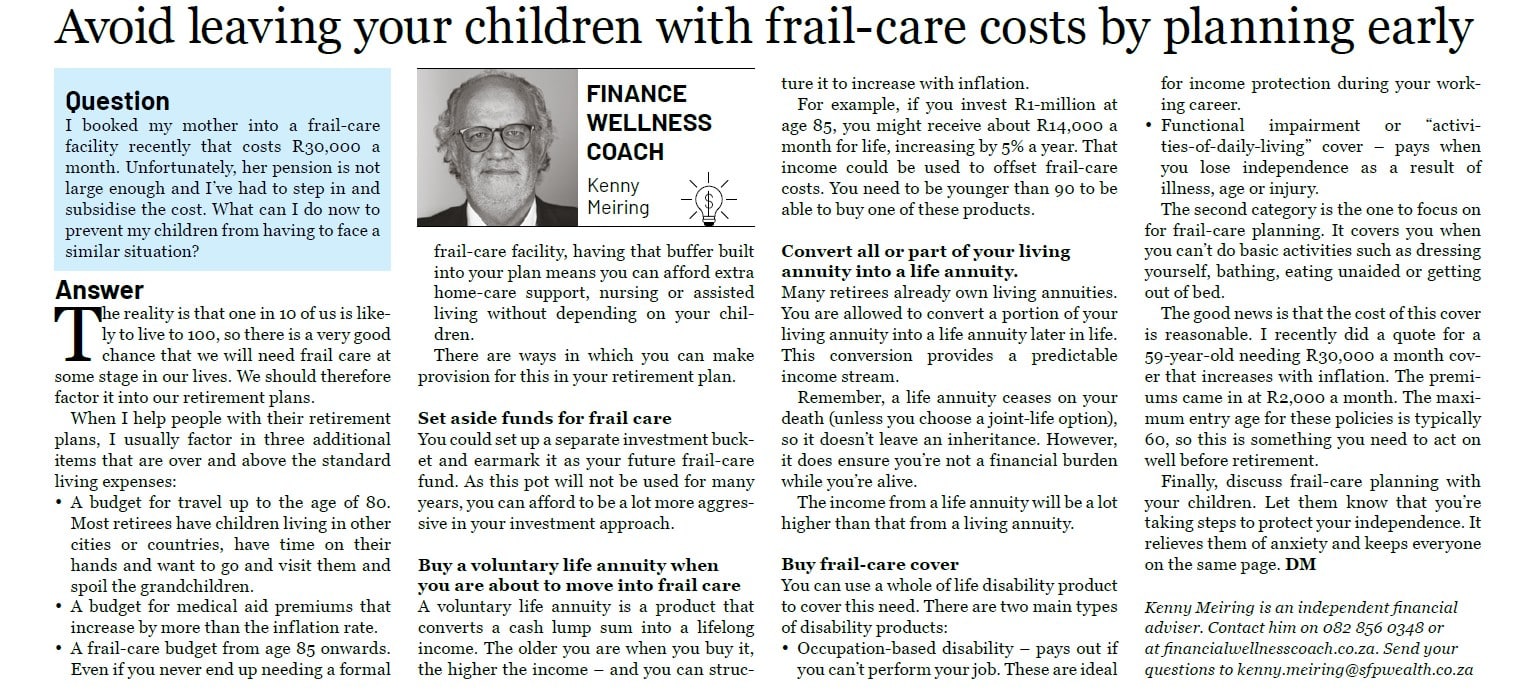No. 229 – Avoid leaving your children with frail-care costs by planning early
Question
I booked my mother into a frail-care facility recently which costs R30 000 a month. Unfortunately, her pension is not large enough and I’ve had to step in and subsidise the cost. What can I do now to prevent my children from having to face a similar situation?
Answer
The reality is that 1 in 10 of us is likely to live to 100 so there is a very good chance that we will need frail care at some stage in our lives. We should therefore factor it into our retirement plans.
When I help people with their retirement plans, I usually factor in three additional items that are over and above the standard living expenses:
- a budget for travel up to the age of 80. Most retirees have children living in other cities or countries, have time on their hands and want to go and visit them and spoil the grandchildren.
- A budget for the medical aid premiums that increase by more than the inflation rate
- A frail-care budget from age 85 onwards. Even if you never end up needing a formal frail-care facility, having that buffer built into your plan means you can afford extra home-care support, nursing, or assisted living without depending on your children.
There are a couple of ways in which you can make provision for this in your retirement plan
1 Set aside funds for frail care
You could set up a separate investment bucket and earmark it as your future frail care fund. As this pot will not be used for many years, you can afford to be a lot more aggressive in your investment approach.
- Buy a voluntary life annuity when you are about to move into frail care
A voluntary life annuity is a product that converts a cash lump sum into a lifelong income. The older you are when you buy it, the higher the income — and you can structure it to increase with inflation.
For example, if you invest R1 million at age 85, you might receive around R14 000 a month for life increasing by 5% a year. That income could be used to offset frail-care costs. You need to be younger than 90 to be able to buy one of these products.
- Convert all or part of your living annuity into a life annuity.
Many retirees already own living annuities. You are allowed to convert a portion of your living annuity into a life annuity later in life. This conversion provides a predictable income stream which is particularly useful once you’re no longer managing investments yourself.
Remember, a life annuity ceases on your death (unless you choose a joint-life option), so it doesn’t leave an inheritance. However, it does ensure you’re not a financial burden while alive.
The income from a life annuity will be a lot higher than that from a living annuity.
- Buy frail care cover
You can use a whole of life disability product to cover this need. There are two main types of disability products:
- Occupation-based disability – pays out if you can’t perform your job.
- These are ideal for income protection during your working career.
- Functional impairment or “activities-of-daily-living” cover – pays when you lose independence due to illness, age, or injury.
The second category is the one to focus on for frail-care planning. It covers you when you can’t do basic activities of daily living such as dressing yourself, bathing, eating unaided, or getting out of bed. These are exactly the triggers that result in you needing frail care.
The good news is that the cost of this cover is reasonable. I recently did a quote for a 59-year-old, needing R30 000 a month cover that increases with inflation. The premiums came in at R2 000 a month. The maximum entry age for these policies is typically 60, so this is something you need to act on well before retirement.
Finally, discuss frail-care planning with your children. Let them know that you’re taking steps to protect your independence. It relieves them of anxiety and keeps everyone on the same page.
By planning ahead for frail care, you buy yourself peace of mind, dignity, and control over your later years. You also give your children the priceless gift of freedom from financial worry.
KENNY MEIRING IS AN INDEPENDENT FINANCIAL ADVISER
Contact him via phone, email or via contact phone on the financialwellnesscoach.co.za website

Read more of our articles on the Daily Maverick website or newspaper weekly!

